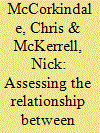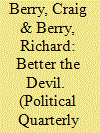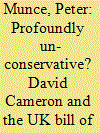| Srl | Item |
| 1 |
ID:
114762


|
|
|
|
|
| Publication |
2012.
|
| Summary/Abstract |
In this article, the authors will consider a very narrow yet spectacularly important aspect of the rule of law: its place in a constitution-the constitution of the United Kingdom-in which supremacy rests not with the constitution as a document to be interpreted by a constitutional court, but with the legislature itself. While traditionally the supremacy of the Crown in Parliament has meant that British courts have had no right to set aside even the most oppressive legislation, recent extra-judicial writings and obiter dicta in case law have been indicative of a shift in the judicial mood. In light of these developments, the paper will ask: Where does the relationship between the supremacy of the Crown in Parliament and the rule of law stand now? Where might that trajectory take us? And what might be done to reconcile the two?
|
|
|
|
|
|
|
|
|
|
|
|
|
|
|
|
| 2 |
ID:
130944


|
|
|
|
|
| Publication |
2014.
|
| Summary/Abstract |
Gus O'Donnell's vision of 'better government' is presented as a critique of party politics, most specifically the short-termism, selfishness and incompetence of elected politicians. There are few people better placed than O'Donnell to form such judgements. However, O'Donnell goes much further, by calling into question the legitimacy of the democratic system which gives rise to party politics. His article outlines several mechanisms by which the exercise of power by elected ministers could be constrained by a managerialist accountability framework, without addressing the question of who determines the appropriate framework for ministerial performance. The House of Commons is condemned as 'too politicised'. O'Donnell also offers substantial praise for apparently 'depoliticised' policy-making processes, overlooking the inherently political constitution of such processes. In doing so, O'Donnell claims to be challenging party politics on behalf of voters/taxpayers, but instead seeks to dismantle any possibility of the public expressing a collective will via the ballot box that might challenge the immutability of the market economy.
|
|
|
|
|
|
|
|
|
|
|
|
|
|
|
|
| 3 |
ID:
111657


|
|
|
|
|
| Publication |
2012.
|
| Summary/Abstract |
This article considers David Cameron's proposal to repeal the Human Rights Act (HRA) and replace it with a British Bill of Rights. Cameron's proposal has been heavily criticised by a range of political, academic and non-state actors and was described by a current senior Coalition Cabinet member as 'xenophobic' and 'legal nonsense'. This article takes a slightly different direction to those lines of attack and critique that have been developed of the Conservative's proposals. The central proposition of the article is that Cameron's proposal is profoundly un-Conservative at two levels. Firstly, at the level of Conservative approaches to constitutional reform and secondly, at the level of Conservative political philosophy.
|
|
|
|
|
|
|
|
|
|
|
|
|
|
|
|